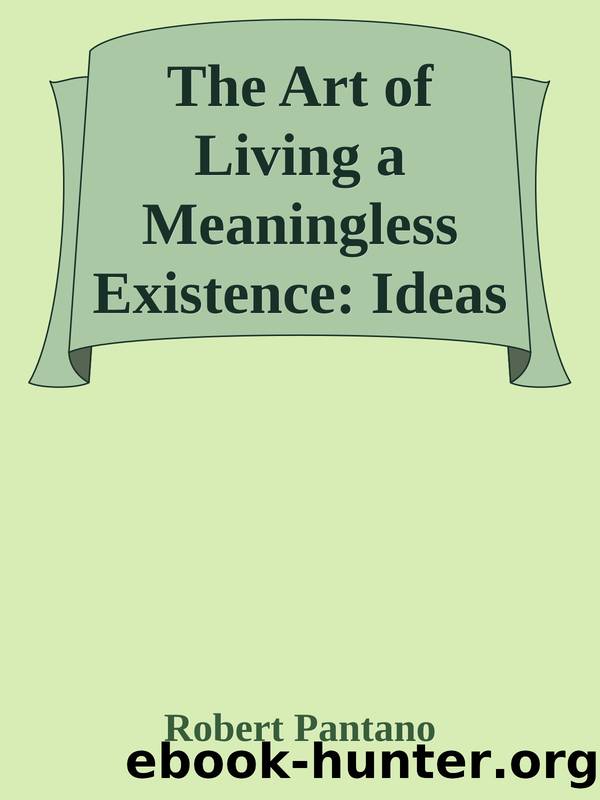The Art of Living a Meaningless Existence: Ideas from Philosophy That Change the Way You Think by Robert Pantano

Author:Robert Pantano
Language: eng
Format: epub
Published: 2022-07-17T18:30:00+00:00
DONâT WATER IT DOWN
The Philosophy of Franz Kafka
Franz Kafka is regarded as one of the greatest literary figures in recent history. He is known for his uniquely dark, disorienting, and surreal writing styleâ
a style and quality so particular to him that anything that resembles it has come to be known as Kafkaesque.
Kafka was born in Prague in 1883 to Herman and Julie Kafka. His father was a well-to-do businessman who, through sheer force of will and a brash, aggressive personality, managed to rise from the working class, build a successful business, marry a well-educated woman, and become a member of the upper-middle class. As parents tend to do, Herman hoped for a child that would measure up to his ideal of a person. Franz Kafka was not that. Franz was born a small, anxious, and sickly boy, and he mostly remained that way. As a result, through no fault of his own, Franz would become a great source of disappointment for his father and a sort of psychological punching bag for him as he attempted to mold Franz into who he wished he was but could never be.
Throughout his adolescence, Franz developed an urge to write as a means of dealing with his increasing sense of anxiety, guilt, and self-hatred. Of course, his father did not allow him to pursue writing and ultimately defined the borders of Kafkaâs life, forcing him to pursue law as a profession instead.
During his time studying law in college, Kafka continued writing and met one of his only real friends, Max Brod, another writer who would eventually convince Kafka to publish his first three collections of work. These pieces sold very poorly, though, and essentially went unnoticed.
After college, Kafka would go on to work in a law office, and then for an insurance company.
Here, Kafka would become subject to long hours, unpaid overtime, massive amounts of paperwork, and absurd, complex bureaucratic systems. Kafka was understandably miserable.
While working at the insurance company, Kafka continued writing on the side, producing some of his most notable pieces, including The Trial, The Castle, and Amerika. He did not attempt to publish any of these at the time, however, and even left much of his work unfinished. Kafka continued working at the insurance company for the majority of his remaining short life, while also continuing to write around his work schedule. In 1924, he died of tuberculosis at age forty-one. With exception to the few initial story collections, he never published any of his writing during his lifetime nor did he ever receive any recognition for the small amount he did. He died believing that his work wasnât any good. On his death bed, he even instructed Max Brod to burn all of his unpublished manuscripts following his death. Obviously, Brod did not follow Kafkaâs instructionsâand here we are, about one hundred years later, talking about him.
After Kafka died, Brod spent the following year or so working to organize and publish Kafkaâs notes and manuscripts. Over the following decade, Kafka would become one of the most
prominent literary and philosophical figures of the twentieth century.
Download
This site does not store any files on its server. We only index and link to content provided by other sites. Please contact the content providers to delete copyright contents if any and email us, we'll remove relevant links or contents immediately.
The remains of the day by Kazuo Ishiguro(8964)
Tools of Titans by Timothy Ferriss(8359)
Giovanni's Room by James Baldwin(7315)
The Black Swan by Nassim Nicholas Taleb(7097)
Inner Engineering: A Yogi's Guide to Joy by Sadhguru(6783)
The Way of Zen by Alan W. Watts(6590)
Asking the Right Questions: A Guide to Critical Thinking by M. Neil Browne & Stuart M. Keeley(5751)
The Power of Now: A Guide to Spiritual Enlightenment by Eckhart Tolle(5741)
The Six Wives Of Henry VIII (WOMEN IN HISTORY) by Fraser Antonia(5493)
Astrophysics for People in a Hurry by Neil DeGrasse Tyson(5172)
Housekeeping by Marilynne Robinson(4433)
12 Rules for Life by Jordan B. Peterson(4298)
Double Down (Diary of a Wimpy Kid Book 11) by Jeff Kinney(4257)
The Ethical Slut by Janet W. Hardy(4236)
Skin in the Game by Nassim Nicholas Taleb(4232)
Ikigai by Héctor García & Francesc Miralles(4229)
The Art of Happiness by The Dalai Lama(4118)
Skin in the Game: Hidden Asymmetries in Daily Life by Nassim Nicholas Taleb(3986)
Walking by Henry David Thoreau(3949)
